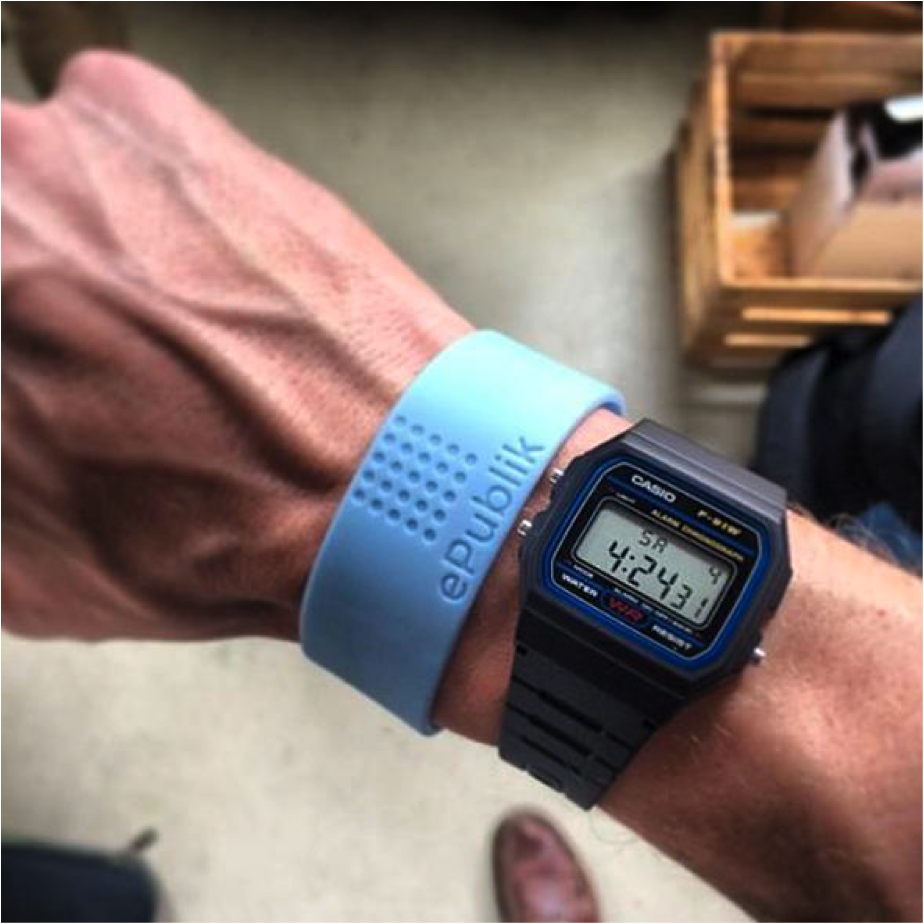
Courtesy of Isaac Eddy
The year is 2020, and four months ago, a federal mandate required everyone to wear a biometric device that would not only track physiological and behavioral characteristics, but transmit this personal data to the public and the government in real time.
The company that invented this device—ePublik—never intended for their technology to be used for government surveillance. Acting in protest, its engineers have found a way to unlawfully hack the device and temporarily disable the live stream. Those courageous enough to disobey government surveillance for brief moments of unmonitored alone time are joining what the media has called the Aloneing Movement.
This was the scenario put forth in Private(i), a participatory performance of future fiction that took place in the Brooklyn Navy Yard for one weekend this April. Set in 2020, Private(i) functioned as a historical reenactment of 2014, a nostalgia-inducing retreat for Aloners who longed for a time when leaving the grid was still an option. Participants were given the chance to spend short spurts of Alone time in secret hiding spaces throughout the sprawling industrial complex.
 Courtesy of Jason Schuler
Courtesy of Jason Schuler
The performance began in a conference room in the Navy Yard's Building 92, where participants were asked to listen to a product demonstration for a vague new ePublik product. About a dozen news articles that span from 2012 to 2020 were posted to the wall, suggesting a not-too-unimaginable vision of the near future. One article from 2018 recounted this story: A man almost dies from being attacked by a swarm of bees, but is rescued by an Amazon.com drone carrying an EpiPen; the biometric data transmited from his bracelet had alerted athorities of his medical situation and exact location.
Ten minutes into the product demonstration, it became clear that the presentation was a front for an undercover escape mission. We were quietly ushered into the building's basement, where we were stripped of our phones and each assigned a tour guide to help us navigate the outdoors. With an experienced "Aloner" named Karla as my guide, I met several other performers who had carved out private spaces on various roofs, boiler rooms, stairwells, and a box truck.

Courtsey of Alessandra Calabi
The box truck was perhaps the most awkward stop on the route: I sat on a hand-painted pillow amongst a handful of deflating balloons under a banner that said "Happy Birthday." A man with pigtail braids and a guitar in his lap introduced himself as David and handed me a store-bought brownie with a lit candle in the middle. When I blew out the candle, he began to play the acoustic and asked me what I'd wished for. Not exactly the type of experience I imagine when thinking about solitude.
A stop that felt more appropriate came later, when a guy on a rooftop handed me a plate and asked me to throw it against a wall. The adrenaline spike and elevated heart rate would have sent red flags to authorities had my biometric device signal not been jammed.

Courtesy of Alessandra Calabi
Pretending to rebel against wearable technology in the year 2020 was definitely the closest I had ever come to larping (Live Action Role Playing), and while I didn't necessarily glide into my role as easily as I had hoped, I did see the potential for larp as an artistic context in which to experiment with possible responses to hypothetical realities that, sooner or later, may become our own. As others have pointed out, larping (particularly as it is practiced in the Nordic Larp community) can be a powerful catalyst for sociological reflection, political activism, and social change—allowing participants to become distanced observers from the world in which they live while engaging experimentally in an alternative reality that could describe what is to come.
In the world of 2020 set forth by Private(i), the word hacking is more often followed by "out of" than "into." In 2014, we most often understand hacking to mean "getting into" somewhere we aren't supposed to be, and we fear the breach of our own privacy when unknown vigilantes pry into our accounts. But if the future is anything like how the artists behind Private(i) predict it will be, the only way to protect our privacy will be to become hackers ourselves, creating glitches in the system that binds us.
See also: "A Very Brief History of Larp," Part 1, Part 2, Part 3.

